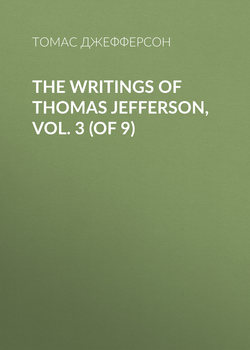Читать книгу The Writings of Thomas Jefferson, Vol. 3 (of 9) - Томас Джефферсон, Thomas Jefferson - Страница 17
PART II.—Continued.
LETTERS WRITTEN WHILE IN EUROPE.
1784-1790
TO DOCTOR PRICE
ОглавлениеParis, May 19, 1789.
Dear Sir,—Your favor of the 4th instant is duly received. I am in hourly expectation of receiving letters permitting me to go to America for a few months, and shall leave Paris within a very few days after I shall have received them. As this is probably the last letter I can have the honor of writing you before my return, I will do myself the pleasure of putting you in possession of the state of things here at this moment, as it may enable you better to decide between truth and falsehood for some time to come. You already know that the States General are met, and have seen the speeches of the King, the Garde des Sceaux, and of Mr. Neckar. The three orders as yet, set in different chambers. The great parliamentary question whether they shall vote by orders or persons is undecided. It has not yet been formally proposed, but the votes already given in the separate chambers on the outworks of that question, show that the Tiers Etat are unanimous for voting by persons. A good majority of the Clergy of the same disposition, and only fifty-four of the Noblesse against one hundred and ninety of the same body, who are for voting by orders. The chambers have appointed committees to confer together on the means of conciliation, but this is mere form, conciliation being impracticable. The Noblesse, as some think, would be induced to unite themselves into one house, with the higher Clergy, the lower Clergy and Tiers forming another. But the Tiers are firm, and will agree to no modification. They are disposed to reduce the State to one order as much as possible. As we are always disposed to conjecture on the future, it is natural to form conjectures as to the issue from the present difficulty. One idea is, that they will separate to consult their constituents. I think they will not do this, because they know their constituents will repeat the same instructions. And what in the meantime is to become of a government which cannot keep in motion with less than a million of livres a day? A more probable conjecture is, that when it shall be manifest that conciliation is impracticable, the Tiers will invite the other orders to come and take their places in the common chamber. The majority of the Clergy, (to wit, the curés, and the minority of the Noblesse,) will accept the invitation. The chamber thus composed, will declare that the States General are now constituted, will notify it to the King, and prepare to proceed to business. If he refuses to acknowledge them, and adheres to the principles of the Noblesse, they will suspend all taxes, form a declaration of rights, and do such other acts as circumstances will admit, and go home. The tax-gatherers will be resisted, and perhaps the soldiery take side with the Tiers, and their officers with the Noblesse. But I rather suppose the King will do business with the States so constituted, negotiating at the same time as they go along, a reconciliation with the seceding members. The latter may in that case excite small and partial troubles, but cannot make a serious resistance. It is very important that the lower Clergy side with the Tiers. They are the effective part of that order, while the bishops and archbishops are held in detestation. But you are to keep in mind that these are conjectures, and you know how small a circumstance may give a totally different turn from what has been plausibly conjectured. My hope is that the mass of the Bourgeoisie is too well in motion, and too well-informed to be resisted or misled, and ultimately that this great country will obtain a good constitution, and show the rest of Europe that reformation in government follows reformation in opinion. I am, with sentiments of the most perfect esteem and attachment, dear Sir, your most obedient, and most humble servant.
